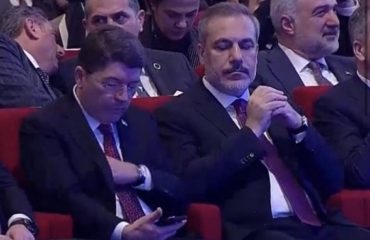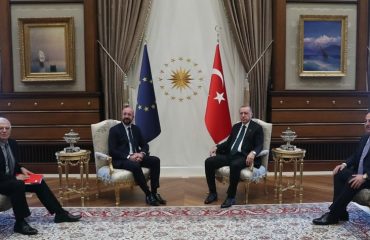
It truly was an outlandish scene. Just as the Justice and Development Party’s (AKP) consultative body meeting started on October 5, Turkish President Tayyip Erdoğan sent his recovery wishes for inpatient Nationalist Movement Party (MHP) leader Devlet Bahçeli, in the name of “all of the Welfare Party (RP)”. There was round applause, albeit not too strong. The RP as one of predecessors of the AKP had been closed down in 1998 by the Constitutional Court; Erdoğan’s was a Freudian slip.
Then, Minister of Defence Hulusi Akar, whose AKP membership status in unknown, quietly interfered from his front seat and said: “AKP, say AKP”. At first, Erdoğan didn’t notice the mistake but after a couple more warnings by Akar, he realized it and corrected himself: “all of the Justice and Development Party”; thunders of applause ensued. The family members present at the meeting seemed the most relieved by this correction, as was reflected in their facial expressions.
Where to begin? Should we question why Erdoğan’s, evidently guided by a prompter, started off the advisory board meeting by thanking MHP’s Bahçeli? What about the fact that the only person in the meeting to carefully listen and audaciously correct Erdoğan was Akar? Or should we consider Erdoğan’s Freudian slip, revealing that his master, perhaps subconsciously, is still RP’s late Necmettin Erbakan? Although he is a president with an extraordinary level of authority in his hands, Erdoğan’s inner struggle still seems to be with Erbakan.
Perhaps it’s best to start with inpatient Bahçeli. On October 4 Bahçeli said that the Republican People’s Party (CHP) leader Kemal Kılıçdaroğlu should be strip off from his parliamentary immunity, put on trial and it’s safe to say that this was something breaking the mold.
Bahçeli and some small political tremors
MHP leader Devlet Bahçeli requesting CHP leader Kemal Kılıçdaroğlu be put on trial due to his relations with the Kurdish problem-focused Peoples’ Democratic Party (HDP) can be considered one of the most dangerous political developments in recent memory. Predictions of a series of “small political tremors” in Ankara that emerged following the AKP-People’s Alliance coalition’s failure at local elections have started to manifest themselves sooner than anticipated.
Bahçeli’s written statement aiming to incarcerate Kılıçdaroğlu was akin to submitting a petition directly to President Erdoğan. Before Bahçeli’s request, there was a debate whether to lower the Presidential election threshold from 50+1 to 40 per cent. This idea, which would make way for a transition to a parliamentary system, could rule out Erdoğan’s dependence on Bahçeli. Is it a coincidence that the time for Erdoğan’s advisory board meeting in Kızılcahamam was set right before Bahçeli made his move?
Bahçeli, who is perhaps one of the most talented tacticians in Turkish political history, has intervened just in time. It was as if he was asking “shall we continue, or else” to Erdoğan and the answer he was hinting at involved a conspiracy to wipe Erdoğan’s biggest political rival, KIlıçdaroğlu, off the political map.
Kılıçdaroğlu: they want to silence me
Considering Kılıçdaroğlu is a leader who has been subjected to physical assault multiple times and whom the outlawed Kurdistan Workers’ Party (PKK) attempted to assassinate, Bahçeli’s outburst gets even more irritant.
Kılıçdaroğlu harshly retorted to Bahçeli’s attack on October 5 during the CHP advisory meetings in Abant: “do it if you’ve got the guts”, he said, adding that the government front was trying to silence him. He made special mention of the sale of national tank firm shares to Qatar for ﹩50 million.
The idea of putting a CHP member to prison is not a new debate for the AKP. The information that this was first discussed after CHP member Enis Berberoğlu was imprisoned and Kılıçdaroğlu started the Justice March right after on June 15, 2017, but that Erdoğan didn’t approve this criminal complaint at the time, had circulated in the political backstage in Ankara. Some MHP officials have were reportedly lobbied on the AKP echelons to erase İYİ Parti (GP) leader Meral Akşener off the political board through jurisdiction; this was brought up especially before the 2018 Presidential election.
If you can’t beat them in the poll, put them in jail: a tactic
Bahçeli’s tactics that bring political opportunism to a new low are starting to become clearer.
Bahçeli had passionately defended the 10 per cent electoral threshold to prevent HDP’s entry to parliament; he was firm in this stance until the last moment. He saw that that same threshold worked against him, putting his MHP behind HDP on election night, June 7, 2015. The confidence vote risk looming over the AKP at the time was an opportunity for Bahçeli. After the coup attempt on June 2016, though, the Presidential Government System he created with President Erdoğan rendered it all obsolete: there was no more room for a prime minister, a confidence vote at parliament or a 10 per cent electoral threshold to lean on.
Thus Bahçeli would no longer need to win an election, fight to pass the 10 per cent threshold or struggle to enter the parliament. First, he used the 2017 referendum, then the 2018 Presidential elections, and finally the coalition formed with the AKP before the 2019 municipal elections, dubbed the People’s Alliance. These moves gave him space to manoeuvre and make an impact on how the government is run. For example, he believes he has the right to publicly defend the ministers of Interior and Justice, even against criticisms that come from the AKP.
Bahçeli is conspiring to imprison the rivals he cannot beat, all while putting the burden on Erdoğan and the AKP. And by offering this dangerous deal to Erdoğan, he manages to get Erdoğan’s warrant that “the 40 per cent plan is not in question”.
A dangerous game to play, a trap for democracy
Imprisoning party leaders to get them out of the political equation was considered a byproduct of military coups until recently. Democrat Party (DP) leader Celal Bayar and Prime Minister Adnan Menderes were imprisoned following the military coup of May 27, 1960. Justice Party (AP) leader Süleyman Demirel and CHP leader Bülent Ecevit, both of whom had also served as President, were imprisoned following the coup on September 12, 1980. Among the leaders imprisoned by the September 12 regime were National Salvation Party (MSP) leader Necmettin Erbakan, alongside whom Erdoğan had entered the political scene, as well as MHP leader Alparslan Türkeş – Bahçeli had begun his career during his leadership. (Türkeş was also a member of the May 27 junta, the first military intervention to politics in Turkish democratic history, though he had objected the executions of PM Menderes, Foreign Minister Fatin Rüştü Zorlu and Finance Minister Hasan Polatkan.) One exception to this trend emerged recently. HDP ex-co-chairs Selahattin Demirtaş and Figen Yüksekdağ were arrested and imprisoned in November 2016; before that, there was a failed coup attempt on July 15, 2016.
Right now, thankfully, there is neither coup nor coup attempt at hand. But there is Bahçeli’s attempt to get main opposition CHP’s leader Kılıçdaroğlu, who was successful in his the coalition formed before the municipal elections, off the board by incarcerating him.
Bahçeli’s proposal looks like a trap that will harm not only Kılıçdaroğlu but also Erdoğan himself and pluralist democracy in Turkey – or what is now left of it. Once we take this road, anyone can find themselves fall victim to it – including those that made the way.


